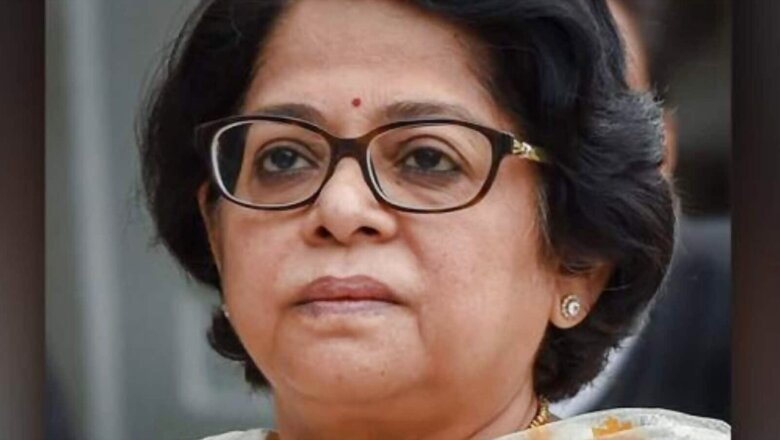
views
The Supreme Court on Wednesday appointed former Supreme Court Judge Justice Indu Malhotra to head the Committee to enquire into Prime Minister Narendra Modi’s security lapse incident in Ferozepur on January 5. The Director-General of the National Investigation Agency, Director General of Police of Union Territory of Chandigarh, ADGP (Security) of Punjab and the Registrar General of the Punjab and Haryana High Court (who has seized the records relating to PM’s visit) are the other members of the Committee.
Who is Indu Malhotra?
Former Justice Indu Malhotra was the first woman judge to be appointed to the Supreme Court Bench directly from the Bar, joining the ranks of six other women who have been appointed as SC judges in India since Independence. She served as judge in SC for close to three years from April 2018 to March 2021.
Born in Bangalore, Malhotra did her schooling in Delhi and her BA from Lady Shri Ram College in New Delhi. She was the daughter of a well-known advocate, late Om Prakash Malhotra, and she enrolled in the Bar Council of Delhi in 1983, and qualified as an Advocate-on-Record in the Supreme Court in 1988.
From 1991 to 1996, Indu was appointed as the standing council for Haryana in the apex court. In 2007, she was designated as senior advocate by the Supreme Court, and is the second woman in history to get this tag, as per a Femina report.
What are the landmark cases Indu Malhotra was part of?
In her short tenure, Justice Malhotra was on Constitution benches dealing with far-reaching issues of constitutional importance such as entry of women to Kerala’s Sabarimala temple, the validity of Section 377 (same-sex relationship) of the Indian Penal Code (IPC) as well examining allegations of sexual harassment against the then Chief Justice of India, Ranjan Gogoi.
In the Section 377 – criminalisation of same-sex relationships – case, Malhotra, in union with the other judges in the bench, held that it was unconstitutional to the extent that it criminalised consensual sexual acts of adults in private. She, in fact, went a step ahead and said history owes an apology to the members of this community and their families, for the delay in providing redressal for the ignominy and ostracism that they have suffered through the centuries
Malhotra, however, took a lone dissenting stand in the Sabarimala case by refusing to lift the restriction on women between the ages of 10 to 50 years from entering the temple. “Notions of rationality cannot be invoked in matters of religion,” she observed. Swarajya, a right-wing digital news platform, called her a “dissenting hero” for her judgment in the contentious case.
The only woman on the bench, Malhotra said, “issues of deep religious sentiments should not be ordinarily be interfered by the court. The Sabarimala shrine and the deity is protected by Article 25 of the Constitution of India and the religious practices cannot be solely tested on the basis of Article 14.”
Her dissent in the case paid way for hundreds of pleas, and writ petitions against the majority judgment striking down the rule that restricted entry of women between the ages of 10 to 50 years to the temple, a Leaflet report said.
Malhotra was later made part of an in-house inquiry committee that cleared the then CJI Ranjan Gogoi of sexual harassment allegations. An SC staffer, who worked as a junior court assistant, had alleged that she had been sexually harassed by Gogoi. The survivor, a court staff member, later withdrew her complaint stating that she had not been allowed to have a lawyer present and was not informed about the procedure that would be followed. Finally, the in-house committee said it “found no substance in the allegations contained in the Complaint dated 19.04.2019 of a former employee of the Supreme Court of India.”
Indu Malhotra, after her Supreme Court tenure
At a function organised by the Supreme Court Bar Association, Justice Malhotra said later on her farewell day, “A judge derives great satisfaction when a long drawn litigation is brought to a close or justice is done to those who are voiceless.” Judges appreciated the fact that the institution was “far greater than the individuals who compose the Bench”, she noted.
Former CJI Bobde said he had not seen a finer judge than Justice Malhotra. Justice D.Y. Chandrachud, with whom she shared the Bench, called her an “icon”.
On September 16, 2021, the Delhi and District Cricket Association (DDCA) held its Annual General Meeting (AGM) and Justice Indu Malhotra, former judge of Supreme Court of India, was appointed as the Ombudsman cum Ethics Officer.
Read all the Latest India News here



















Comments
0 comment